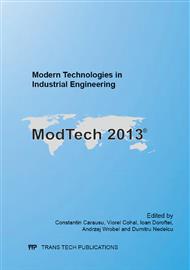p.346
p.351
p.357
p.363
p.369
p.375
p.381
p.387
p.393
UML Models of Design and Knowledge Representation for Technical Production Preparation Needs
Abstract:
Having in mind the need of the computer adding of the technical production preparation functions the elaboration of models of the design and knowledge representation is essential. In order to prepare these models the object paradigm in the meaning of object oriented techniques and the UML language would be applied. Thanks to this solution the coherent representation of the design and manufacturing knowledge in the framework of a new created CAPP is possible to achieve. The main purpose of the presented work is to show and discuss original models of a design and manufacturing knowledge representations. In the proposed solution the product design is represented by means of the hierarchical class structure in which a particular class is responsible for representing a characteristic type of the model feature. The manufacturing knowledge similarly to knowledge representation is also represented by means of the hierarchical class structure. Each class in the manufacturing knowledge model stores a certain amount of manufacturing knowledge. This model allow representing both procedural and declarative knowledge. The declarative character of the model results from storing of manufacturing process planning rules whilst procedural one from recording of manufacturing instrumentation, cutting parameters etc. selection procedures. Having these models done it is possible to undertake a research on connections between a design and manufacturing knowledge representations.
Info:
Periodical:
Pages:
369-374
DOI:
Citation:
Online since:
November 2013
Keywords:
Price:
Сopyright:
© 2014 Trans Tech Publications Ltd. All Rights Reserved
Share:
Citation:


